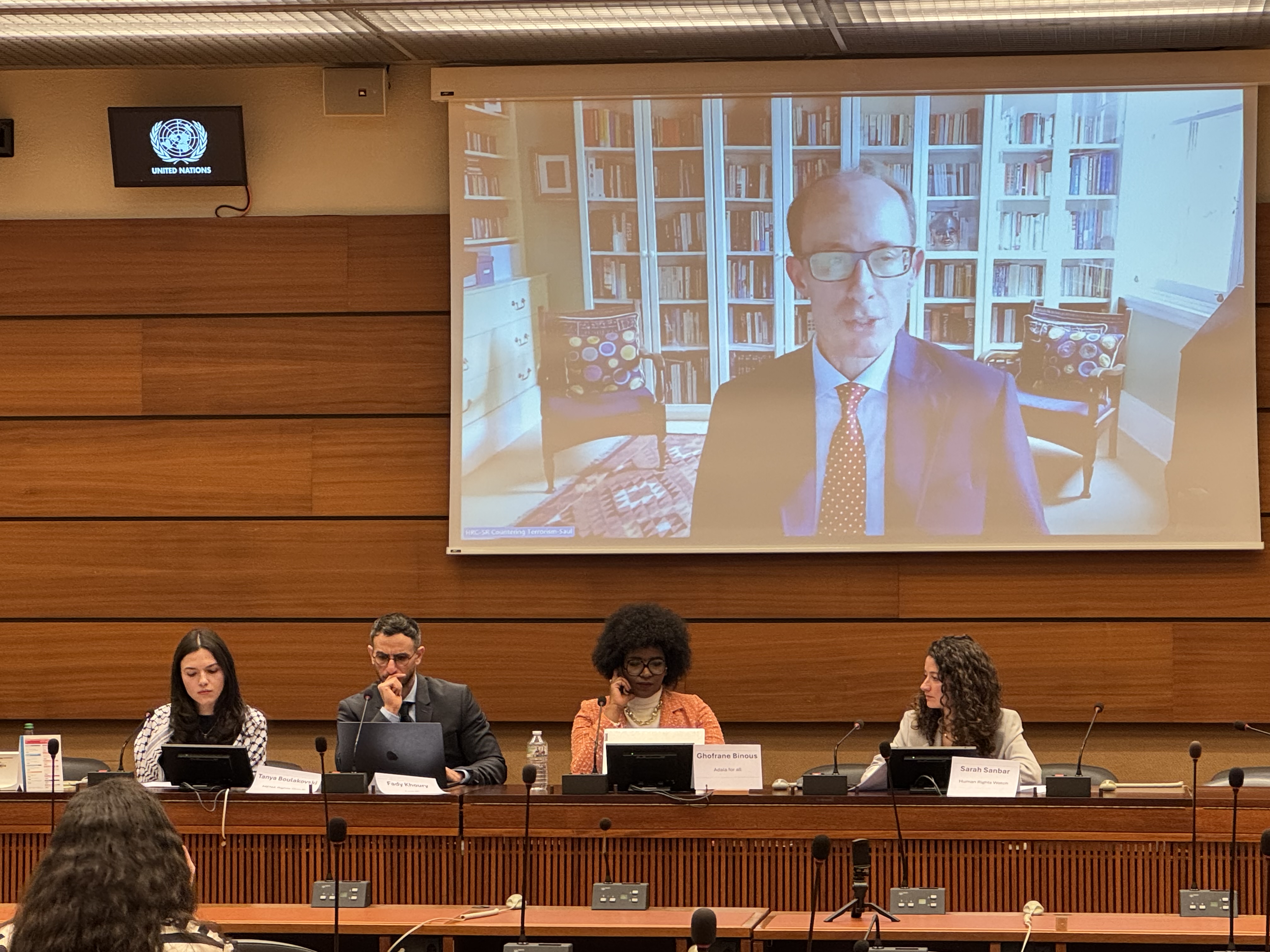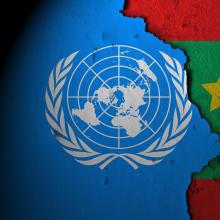April 17, 2025

From left to right: Tanya Boulakovski, Fady Khoury, Ghofrane Binous, Sarah Sanbar, and Special Rapporteur Ben Saul (on the screen) speak on counter-terrorism abuse in the MENA during an event at the UN human rights council in Geneva on 10 March 2025.
On March 10, 2025, during the 58th session of the United Nations (UN) Human Rights Council (HRC) in Geneva, MENA Rights Group and Saferworld co-organised a side event highlighting the abuse of security and counter-terrorism measures in the MENA as well as their impact on human rights.
The panel discussion brought together human rights experts and civil society actors from across the region. These included Ben Saul, UN Special Rapporteur on human rights and counter-terrorism, Fady Khoury, Palestinian attorney working with Adalah, Ghofrane Binous, Tunisian activist and advocacy officer at Adala For All, and Tanya Boulakovski, Human Rights Officer at MENA Rights Group. The discussion was moderated by Sarah Sanbar, Iraq Researcher at Human Rights Watch.
In his intervention, UN Special Rapporteur Ben Saul focused on the ways counter-terrorism laws and their vague definitions of terrorism are used to crackdown on civic space and peaceful dissent in MENA countries. He emphasised the Arab Interior Minister’s Council (AIMC)’s role in facilitating the political extradition of human rights defenders to countries where they face torture. Particularly, he expressed concern over the recent extradition of the Egyptian poet Abdulrahman al-Qaradawi from Lebanon to the United Arab Emirates, where he was forcibly disappeared. The Special Rapporteur also highlighted Israel’s ongoing violations of international law in numerous MENA countries, including in Lebanon, Syria and Palestine, and called for the immediate end to Israel’s illegal occupation.
Ghofrane Binous spoke about the human rights impact of counter-terrorism legislation and measures in Tunisia, and the increasingly shrinking civic space in the country. She explained that the Tunisian counter-terrorism law is notably used to repress NGOs denouncing racial discrimination and abuse against migrants from Sub-Saharan Africa, including through accusations of money laundering. She also deplored the introduction in this context of a bill on NGOs, which risks further restricting freedom of association. Equally concerning, she highlighted, is the ongoing collective case against 40 political opposition figures and human rights defenders, who are facing bogus 'conspiracy' charges that carry the death penalty in Tunisia. She concluded with an open call to defend Tunisian civil society.
Tanya Boulakovski provided an overview of what transnational repression looks like in the region, including under the guise of “counterterrorism”. She explained the role of the AIMC in this phenomenon, detailing the practice of circulating state-requested arrest warrants to Arab League member states, leaving targeted individuals unable to challenge their warrants issued against them on discriminatory grounds, and at risk of extradition to countries where they would face torture. She pointed out that despite these human rights concerns, many international institutions continue to collaborate with the AIMC, including INTERPOL, Frontex, and UN counter-terrorism bodies such as the UN Office of Counter-Terrorism, the Security Council’s Counter-Terrorism Committee Executive Directorate, and the UN Office of Drugs and Crime. Boulakovski concluded her remarks with an open warning, highlighting that in the absence of structural reform of the AIMC, Arab dissidents are not safe from transnational repression and must carefully reconsider traveling to Arab League countries.
In his intervention, Fady Khoury shed light on Israel’s counter-terrorism framework and its impact on Palestinians, including in Israel. He notably explained how the Israeli framework creates a dual legal system for regulating speech offenses: one, under the criminal code, that governs general speech offenses and that provides due process guarantees, mainly applied to Jewish citizens of Israel, and another, under the counter-terrorism law, disproportionately applied to Palestinians. He explained that Israel's broad categorisation of certain forms of speech as “apology for terrorism” has led to arrests over social media posts, the vast majority of which have targeted Palestinian citizens of Israel. He stated that these legal restrictions extended to peaceful demonstrations, as people were “arrested on their way to protests” for Gaza. He asserted that Palestinian citizens of Israel had no space for dissent or speech that countered Israel’s narrative around October 7th.
After opening the floor to a few questions from the audience, each panellist delivered some concluding remarks and shared recommendations to remedy some of the abuses committed in the name of the fight against terrorism described during the side event. These included that MENA countries like Tunisia should comply with the international human rights conventions they ratified, that regional bodies like the AIMC should align their practices with international human rights standards, and that the international community should exert pressure on Israel to implement a permanent ceasefire and ensure accountability for violations of international law.
To watch the full event, click here.






